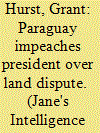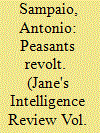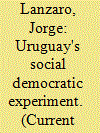|
|
|
Sort Order |
|
|
|
Items / Page
|
|
|
|
|
|
|
| Srl | Item |
| 1 |
ID:
124813


|
|
|
|
|
| Publication |
2013.
|
| Summary/Abstract |
SITTING IN THE RUSSIAN STATE ARCHIVES for Socio-Political History (RGASPI), formerly the Marx-Engels-Lenin Institute, on Bolshaya Dmitrovka Street in Moscow, I hold in my hands a top secret, until recently, folder with unique documents in Russian, Spanish and English.
It contains materials from the history of the organization with the name exotic even for political gourmands. I mean the Paraguayan Communist Party (PCP) of the mid-1930s.
|
|
|
|
|
|
|
|
|
|
|
|
|
|
|
|
| 2 |
ID:
115428


|
|
|
| 3 |
ID:
129522


|
|
|
| 4 |
ID:
078967


|
|
|
|
|
| Publication |
2007.
|
| Summary/Abstract |
It is widely accepted that the Tri-Border Area between Argentina, Brazil and Paraguay is a nexus in global terrorist support, and perhaps even operations. However, it is rather more difficult actually to provide evidence of this connection. The region is certainly a smuggling haven, and has substantial populations from the Middle East. Beyond remittances sent to the Middle East - some of which flows to such organisations as Hezbollah - there is little hard evidence available to the academic researcher. Thus the study of this purported crime-terror nexus provides a valuable opportunity for academic researchers to question the assumptions and assertions of policy-makers and pundits, push for transparency of information on the reality of the region and even help understand the problem better
|
|
|
|
|
|
|
|
|
|
|
|
|
|
|
|
| 5 |
ID:
115476


|
|
|
| 6 |
ID:
105224


|
|
|
|
|
| Publication |
2011.
|
| Summary/Abstract |
In its Cold War struggle against communism in Latin America, the John F. Kennedy Administration faced a dilemma. How could it maintain the support of anticommunist yet authoritarian regimes whilst concurrently promoting the political liberalisation of those regimes, as Kennedy's core policy toward Latin America-the Alliance for Progress-seemingly mandated? In Paraguay, the Stroessner regime provided Kennedy officials with a clear test of its ability to craft a policy that appropriately balanced both considerations. This case study explores how bureaucratic politics decisively shaped the implementation of that policy, ultimately leading to a continuation in the broader pattern of maintaining support for authoritarian regimes that embraced US leadership in the Cold War.
|
|
|
|
|
|
|
|
|
|
|
|
|
|
|
|
| 7 |
ID:
127609


|
|
|
|
|
| Publication |
2014.
|
| Summary/Abstract |
At the dawn of the twenty-first century, a historic change took place in Latin America. Through democratic elections, left-leaning governments were established in a large group of countries (Argentina, Bolivia, Brazil, Chile, Ecuador, El Salvador, Nicaragua, Paraguay, Peru, Venezuela, and Uruguay). Even
if this turn to the left has the nature of a "wave," the governments that are part of it show a marked diversity. Among them, the new populists (Venezuela, Bolivia, Ecuador) stand out, as well as the Kirchners (Néstor and then his widow, Cristina), in Argentina, who offered a progressive version of the versatile Peronist movement. These governments have their peculiarities, no doubt, but they are rooted in the old trunk of populism, which has been a recurrent political phenomenon in Latin America during different historical stages and with different ideological leanings, from left to right.
|
|
|
|
|
|
|
|
|
|
|
|
|
|
|
|
|
|
|
|
|